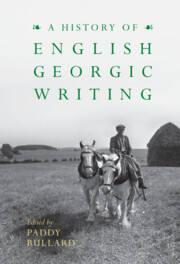Book contents
- A History of English Georgic Writing
- A History of English Georgic Writing
- Copyright page
- Contents
- Contributors
- A Note on National Designations
- Abbreviations
- Introduction
- Part I Turnings
- Part II Times
- Chapter 5 Jacobean Georgic
- Chapter 6 ‘Varieties too Regular for Chance’
- Chapter 7 Enlightenment, Improvement and Experimentation
- Chapter 8 Georgic, Romanticism and Complaint
- Chapter 9 Rural Labour in an Age of Industry
- Chapter 10 Labour Isn’t Working
- Chapter 11 Twentieth-Century Georgic
- Chapter 12 Rags and Tatters
- Part III Territories
- Bibliography
- Index
Chapter 7 - Enlightenment, Improvement and Experimentation
Jethro Tull and His Contemporaries
from Part II - Times
Published online by Cambridge University Press: 01 December 2022
- A History of English Georgic Writing
- A History of English Georgic Writing
- Copyright page
- Contents
- Contributors
- A Note on National Designations
- Abbreviations
- Introduction
- Part I Turnings
- Part II Times
- Chapter 5 Jacobean Georgic
- Chapter 6 ‘Varieties too Regular for Chance’
- Chapter 7 Enlightenment, Improvement and Experimentation
- Chapter 8 Georgic, Romanticism and Complaint
- Chapter 9 Rural Labour in an Age of Industry
- Chapter 10 Labour Isn’t Working
- Chapter 11 Twentieth-Century Georgic
- Chapter 12 Rags and Tatters
- Part III Territories
- Bibliography
- Index
Summary
The eighteenth century is the richest period of georgic writing in English literary history. No era before or since exhibits a like range of experimentation with the georgic form, from translations and formal imitations of the Virgilian original to prose essays, pamphlets, treatises, periodicals and technical manuals. Though various in form and purpose, these texts declare their georgic affiliation by the tropes and themes they employ and by the structure of feeling they evoke. This chapter explores four of these distinguishing features: persistent authorial reflection on the style appropriate to georgic writing (elaborate or plain, poetic or technical?), the labour of the farmer and that of the writer, variety and miscellaneity in the georgic and traditional farming practices versus experimentation. These characteristic concerns are taken up by writers with a wide range of thematic preoccupations: agriculture, labour, sport, human health, mining, manufacturing, empire, nationhood, political economy and slavery.
Keywords
- Type
- Chapter
- Information
- A History of English Georgic Writing , pp. 155 - 176Publisher: Cambridge University PressPrint publication year: 2022

